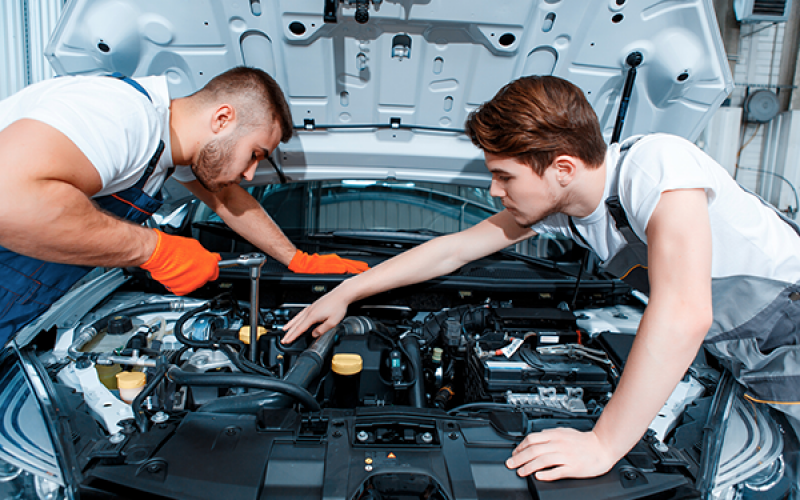All Categories
Featured
Brakes are arguably the most crucial safety attribute of any kind of lorry. Without trusted brakes, also the most effective auto can become a threat on the roadway.
- The Significance of Regular Brake Inspections. Brakes undertake continual wear and tear with every use, whether you're driving at broadband on the highway or travelling via city roads. Over time, brake pads, blades, and other parts put on down, which can affect braking performance. Without normal assessments, you might not notice the gradual decline in efficiency until it's far too late.
Routine brake examinations enable you to catch concerns early, ensuring that your brakes continue to be responsive, dependable, and safe. Timely evaluations can likewise conserve you cash by addressing minor problems before they end up being pricey repair services.
- Usual Signs That Your Brakes Required Interest. While routine brake examinations are very important, there are some caution signs you can keep an eye out for to know when it's time to arrange a check-up:
Squealing or Grinding Seems: High-pitched squeaks or grinding sounds when using the brakes are commonly indicators that your brake pads are broken and require replacement. Vibration or Pulsation: If you feel vibrations in the guiding wheel or the brake pedal, it might suggest distorted blades, which might require resurfacing or changing. Soft or Mushy Brake Pedal: If the brake pedal really feels unusually soft or squishy, there may be air in the brake lines or an issue with the master cylinder. Drawing away: If your vehicle draws to one side while stopping, this might be triggered by uneven brake pad wear or an issue with the brake liquid. Increased Quiting Distance: If it takes longer to stop than normal, it may suggest that the brake pads are worn, the liquid is reduced, or the blades are damaged. If you notice any of these signs and symptoms, it's best to have your brakes evaluated quickly.

- Key Components Checked During Brake Inspections. Throughout a brake inspection, a service technician will certainly examine a number of critical parts of the braking system to guarantee every little thing is functioning effectively. Right here are the key components included:
Brake Pads: The most common factor for bad braking performance is worn-out brake pads. Inspecting the density of the pads is a top priority throughout every inspection. Brake Rotors: Rotors need to be smooth and without grooves or splits. Any considerable damages to the rotors might result in jeopardized stopping efficiency and uneven pad wear. Brake Liquid: Reduced or infected brake liquid can impair braking performance. The specialist will inspect the fluid degrees and top quality and change it if needed. Brake Lines and Tubes: Brake lines should be devoid of leakages or splits. Any kind of damages to the lines can result in loss of brake liquid, resulting in brake failing. Brake Calipers: The calipers use pressure to the brake pads. They need to be examined for signs of wear or leaks to ensure they are functioning correctly. Routinely examining these parts helps maintain your brake system in peak condition, enabling you to quit your auto securely and effectively.
- Just how Usually Should You Have Your Brakes Evaluated? The general recommendation is to have your brakes evaluated at least when a year or every 12,000 miles, depending upon your driving habits. Specific driving problems may call for even more constant examinations:
Heavy Traffic: If you usually drive in stop-and-go website traffic, your brake pads will certainly use down much faster. Hill Driving: Driving on high roads needs more constant braking, which can create your brakes to use faster. Towing or Hauling Heavy Loads: If you routinely carry heavy loads, your brakes will experience extra stress and need more constant inspections. If you discover any one of the warning indications discussed previously, don't await the next scheduled evaluation-- have your brakes examined instantly.
- The Consequences of Ignoring Brake Inspections. Ignoring regular brake examinations can lead to significant repercussions. A failing brake system could cause lowered quiting power, which raises your danger of mishaps. Ignoring brake maintenance can also bring about extra costly repair services. For instance, if you postpone changing worn brake pads, the damages might reach the rotors, resulting in the demand for blades replacement, which is a far more pricey fixing.
In the most awful situation, driving with damaged brakes can result in finish brake failing, placing you and other motorists in jeopardy. Routine brake inspections are a little financial investment that can save your life and avoid costly repair work.
- Verdict: Keep Safe with Routine Brake Inspections. Brakes are not something you intend to take opportunities with. A reliable stopping system is essential for risk-free driving, and regular brake assessments are a basic method to ensure that your auto stops when you require it most. By remaining on top of brake maintenance, expecting warning indications, and having your brakes inspected at the advised intervals, you'll safeguard both your vehicle and your safety and security.
Don't wait till your brakes begin to fail-- schedule routine brake inspections and maintain your vehicle in optimal condition for years to come.
Latest Posts
Keep Your Carpet Looking Its Ideal with Easy, Expert Treatment
Practical Style for every single Home
Learn About the Experts Behind Montclare Auto Repair - Committed to Excellence
